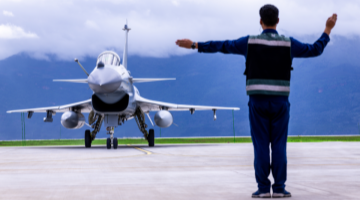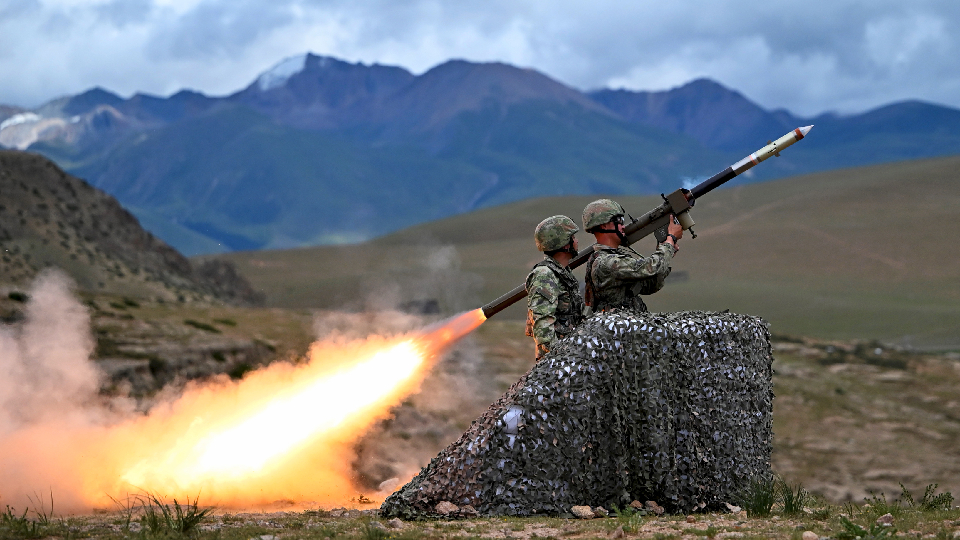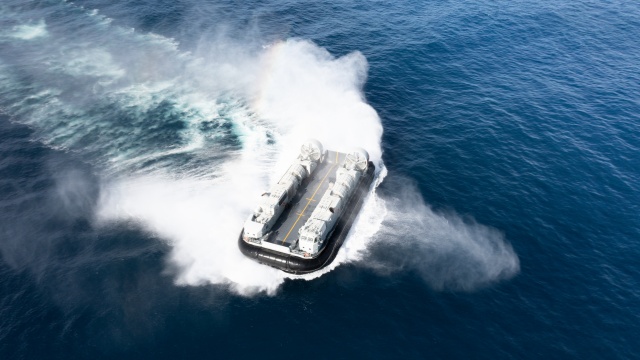By Ling Yunzhi
凌云志
March 29 marks the fifth anniversary of the implementation of Japan's Legislation for Peace and Security (commonly known as the new security bill) that is aimed at lifting the ban on Japan's exercise of the right of collective defense and allowing the Japan Self-defence Forces (JSDF) to conduct military operations at home and abroad in a greater scope.
3月29日,日本旨在允许行使集体自卫权,大幅扩展自卫队海内外军事活动的“安全保障相关法”实施五周年(简称:新“安保法”)。
Japan-US military integration increases the risk of war
日美军事一体化加大“战争风险”
Since the new security bill was adopted five years ago, JSDF has continuously expanded its overseas military operations scope. On the excuse of facing more complicated security threats, Japan has been exaggerating the deterioration of external security environment, increasing its military expenditure year by year, purchasing more high-performance weapons, and carrying out frequent military drills with surrounding countries. All these actions run counter to the spirit of the Peace Constitution.
日本新“安保法”实施5年来,日本自卫队在海外的军事行动范围不断扩大。日本还以面临安全威胁复杂化为由,渲染外部安全环境恶化,逐年递增军费开支,不断加强高性能武器采购,并与周边国家频繁举行军演,这些都同和平宪法的“不战精神”更趋背道而驰。
The implementation of the new security bill leaves the Peace Constitution that commits Japan to giving up war and prohibits its exercise of the right to collective defense an empty shell, and even boosts the JSDF’s cooperation with American military both in peacetime and wartime. It enables Japan, as a US accomplice, to engage more deeply in regional and world affairs and turns it into a country that can step into global military conflicts and disputes any time. Thus, the possibility of it participating in a war is largely increasing.
日本新“安保法”的实施不仅意味着该国放弃战争、禁止行使集体自卫权的“和平宪法”名存实亡,同时也深化了自卫队从平时到战时与美军的合作,让日本追随美国更多地介入地区和世界事务,推动日本成为可以随时介入全球军事冲突和纷争的“可战国”,参与战争的可能性大大提高。
According to public reports, JSDF, on the grounds that “escorting US vessels and military aircraft” has been included in the security bill, carried out joint military operations with US military up to 25 times in 2020, setting a new record in history.
据公开报道,2020年日本自卫队以“守护美军舰艇和军机”纳入安保法为理由,与美军进行的协同任务的次数达到25次,刷新了历史记录。
Besides, JSDF continues to provide maritime fueling service for US Navy’s Aegis combat ship that is tasked with guarding against ballistic missiles from DPRK, and the two latest Maya-class 10,000-ton destroyers are equipped with interoperability systems that can share information with American warplanes and warships in a real-time manner. All these have doubtlessly paved the way for military integration between Tokyo and Washington.
此外,日本海上自卫队继续向负责防卫“朝鲜弹道导弹”的美海军“宙斯盾”战舰提供海上燃油补给,最新的2艘“摩耶”级万吨驱逐舰搭载有可与美军战机和舰艇实时共享信息的“协同作战能力系统”,这些毫无疑问都会为日美军事一体化提供重要的联合基础。
As their military integration keeps deepening, JSDF will step into the international military stage and carry out military interventions in the name of exercising the right to collective defense. At that time, Japan will again become an aggressive nation that is more easily bound by America’s global strategy and more closely following it in randomly using force worldwide, posing a greater risk to itself being embroiled into a war.
在日美军事一体化不断加深的过程中,日本自卫队将会走向国际军事舞台,采取以行使集体自卫权名义进行的武装干涉行动,成为一个具有进攻性战略的国家,同时也将更容易受制于美国全球战略,紧密追随其在全球范围肆意行使武力,大大增加其卷入战争的风险。
Japan-US military integration will be further intensified
未来日美军事一体化将更加紧密
Given the US-Japan relation after WWII, their military integration is based on “mutual agreement” as they each stand to gain from the relation. Washington, in consideration for its own interests and its global and Asian-Pacific strategy, has always hoped that JSDF could play a bigger role and bear more responsibilities in the security domain, so that it could become American military’s main assistant in East Asia, so to speak. Meanwhile, deepening the defense cooperation with Japan can drive a wedge among regional countries and keep them constantly on edge about regional security, which just forms US's “Asian version of NATO” in the region.
从战后长期的日美关系来看,日美军事一体化发展是“两情相悦”,互取所需。美国出于自身利益及其全球和亚太战略考虑,一直希望日本自卫队在安全领域发挥更大的作用和承担更多的责任,从而在某种程度上成为美军在东亚的主要“帮手”,不断深化两国的防务合作关系不断挑拨地区国家矛盾,搅动地区安全敏感神经,以实现其在亚洲地区建立“亚洲版北约”的企图。
After Biden took office, Washington has attached great importance to its allies and partners, and one of its main policies is to give maximum play to their strengths. To that end, it has recently stepped up efforts to rope in the Asian-Pacific allies by sending senior military and government officials to visit Japan and ROK in March, and by holding a video conference of the Quad cooperation mechanism comprising the US, Japan, Australia and India, in the endeavor to expand military alliance in the region.
拜登政府上台后,高度重视同盟伙伴关系,最大限度发挥盟国的力量成为美国的主要策略之一。为此,美国近期加强了对亚太地区盟友的拉拢力度,军政高层于3月份先后出访日本、韩国,并举行“美日澳印”四国合作机制首脑视频会,意图实现拓展地区军事同盟的企图。
On the other hand, the evolving military integration between Japan and the US will make the former more reliant on the latter to some extent. Washington is the dominant side in the bilateral military cooperation, and any reinforcement of the cooperation will make the US have more power in Japan.
同时,日美军事一体化的发展也将使日本在某种程度上更加依赖美国,在日美军事合作中,美国是强势的一方,任何合作紧密化的结果,都会导致强势的一方拥有更大权力,因此,日美军事一体化越深入,就意味着美军在日本拥有更大的权利。
Going forward, the cooperation mode of Japanese and American militaries will shift from each commanding its own troops to joint operation in an more integrated manner. The military integration and interoperability will be further deepened, as well.
未来,“日美两军”在联合作战方面将会逐步改变以往各自指挥各自军队作战的松散联合状况,稳定地向一体化联合方向发展。未来,日美联合作战水平还将会进一步提高,军事一体化程度也将再度深化。
Disclaimer: This article is originally published on The Paper, and is translated from Chinese into English and edited by the China Military Online. The information, ideas or opinions appearing in this article do not necessarily reflect the views of eng.chinamil.com.cn.













